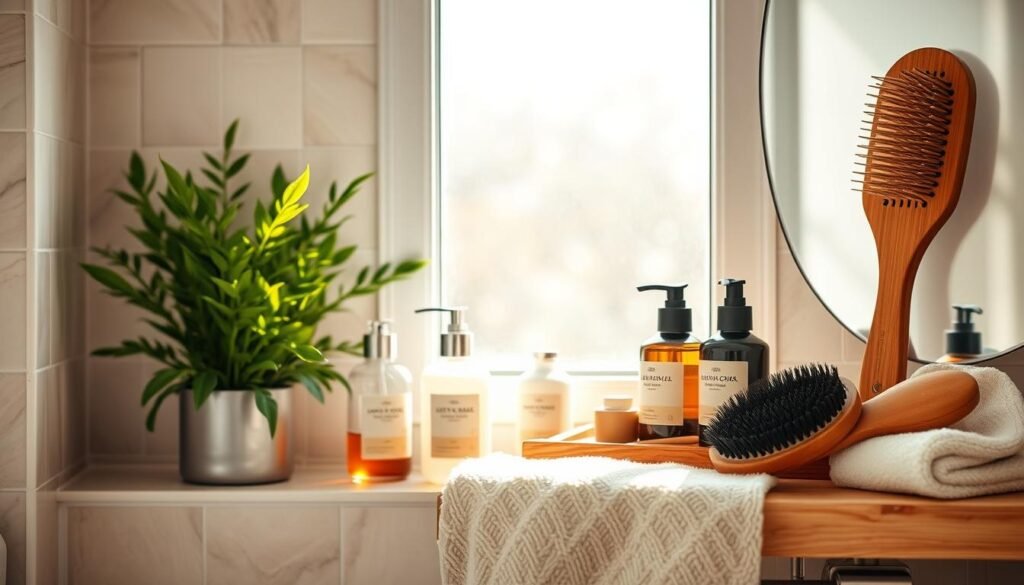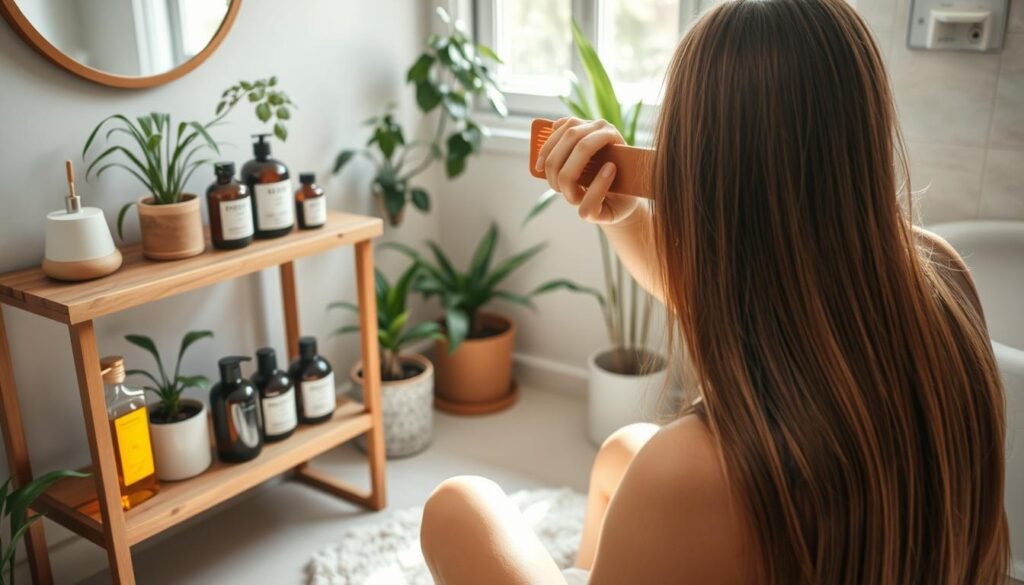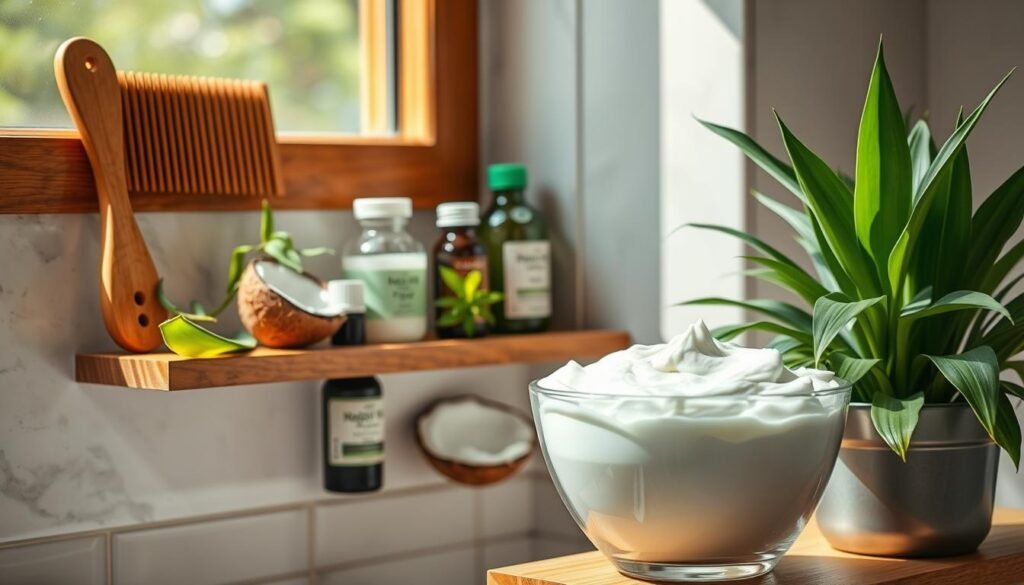About 80 million adults in the United States experience hair loss. That’s one in four men and one in five women. This fact highlights the need for healthy hair care routines. Stress, diet, and the environment can affect hair health. It’s key to take care of your hair properly.
By following good hair care tips and making a routine, you can work towards having stronger, healthier hair.
Key Takeaways
- Understanding your hair type is crucial for maintaining healthy hair.
- Proper cleansing and hydration are vital to prevent hair loss.
- Regular trims help remove damage and split ends.
- Nutrient-rich products boost overall hair health.
- Adopt a balanced diet and stay hydrated for luscious locks.
The Importance of Healthy Hair Care Routines
Hair care is crucial. It reflects one’s health and personality. Knowing the value of hair care boosts one’s look and self-esteem. Regular hair care makes hair stronger and shinier, lowering hair loss risks.
Many ignore the benefits of healthy hair habits. Yet, regular care leads to not just beautiful hair but also better emotional health. Well-kept hair can make people feel more confident and improve how they see themselves. It shows how looking good outside can make us feel better inside.
Taking care of your hair involves many steps. Choosing the right products and keeping your scalp healthy are key. Washing and conditioning regularly, plus getting haircuts on time, keep hair in top shape. Knowing the problems that come with ignoring hair care highlights its importance.
For deeper knowledge, there are resources out there. Following basic hair care principles offers long-term perks, not just good looks. To find a hair care routine that fits your needs, check out this guide.
Common Causes of Hair Loss
It’s key to know why hair loss happens for good prevention. Many things can make hair health worse. Genetics is a big one, as hair thinning or baldness can run in families. Changes in hormones, like during pregnancy or menopause, can cause hair to fall out too.
Some health issues can lead to hair loss too. Alopecia areata makes hair fall out suddenly in patches. Stress-related telogen effluvium temporarily affects hair’s health. Not getting enough iron, protein, or omega-3s is also bad for hair. Eating right is crucial, as shown in this healthy hair nutrition guide.
Pollution and harsh chemicals can damage hair over time. Knowing these causes helps people tackle their hair problems better. Taking action early can boost hair growth and health.
Healthy Hair Care Routines
To keep your hair healthy, develop a routine that you follow regularly. This includes daily care and weekly treatments. It’s also important to know what your hair specifically needs.
Daily Hair Care Routine Essentials
Start your day with a gentle wash. Lukewarm water keeps your hair’s oils balanced. Choose a sulfate-free shampoo to avoid drying out your hair. After shampooing, use a conditioner to keep moisture locked in and make combing easier. These steps reduce breakage and increase shine.
- Use lukewarm water for washing.
- Opt for sulfate-free shampoos.
- Apply conditioner, focusing on the ends.
- Limit heat styling to reduce damage.
Weekly Hair Treatment Practices
Weekly treatments boost your hair’s health. Deep conditioners or masks provide intense nourishment. Use them once a week, unless your hair is very dry or damaged; then, increase frequency. Adding oils like coconut or argan gives your hair a nice gloss.
- Use deep conditioning masks weekly.
- Consider adding hair oils for extra hydration.
- Adjust treatment frequency based on hair type.

Best Hair Care Products for Stronger Hair
Finding the right products is key to getting healthier, stronger hair. Products like shampoo and conditioner should fit your hair’s needs. Fine hair needs volume, and dry hair needs moisture to shine. It’s important to choose the right pair for your hair type to see the best results.
Choosing the Right Shampoo and Conditioner
Choosing the right hair care products starts with knowing your hair. For oily hair, clarifying shampoos work best. Color-treated hair does well with sulfate-free options. Here are tips to pick the best shampoo and conditioner:
- Identify your hair type: fine, thick, curly, or straight.
- Consider any specific issues: dryness, damage, or oiliness.
- Research ingredients that nourish and protect your hair.
Using detoxifying shampoos helps cut down buildup, keeping hair strong and healthy.
Leave-in Treatments and Hair Oils
Leave-in treatments and hair oils are vital for good hair care. They deeply nourish and hydrate the hair. Oils like argan and coconut are famous for hydrating and reducing frizz. These products help by:
- Improving moisture for better hydration.
- Protecting from heat when styling.
- Giving shine and making hair easy to manage.
Adding leave-in treatments to your daily routine can give you professional results at home. For those looking to fix frizzy or damaged hair, investing in top products is wise.
| Hair Type | Shampoo Recommendation | Conditioner Recommendation |
|---|---|---|
| Fine | Volumizing Shampoo | Lightweight Conditioner |
| Dry | Moisturizing Shampoo | Rich, Hydrating Conditioner |
| Color-treated | Sulfate-free Shampoo | Color-lock Conditioner |
With the right shampoo, conditioner, and treatments, anyone can improve their hair’s health and look. Focus on products that fit your hair’s needs for the best care. This leads to maintaining beautiful, healthy hair.
Effective Hair Care Practices for Every Day
Adding good hair care habits to your daily routine can make a big difference in your hair’s health and looks. Gently drying your hair with a towel, rather than rough rubbing, helps avoid damage. This method is a top tip for daily hair care.
It’s also important to not overdo it with heat styling tools. These tools can make your hair dry and fragile. By using a heat protectant spray, you can keep your hair safe from the heat.
Avoiding tight hairstyles can stop hair loss caused by too much pressure on the hair roots. Opting for loose braids or ponytails keeps your style without harming your hair.
Getting regular haircuts is key for healthy hair. It gets rid of split ends and keeps your hair looking good. Experts recommend a trim every six to eight weeks.
Don’t forget about scalp health, as it’s crucial for hair growth. Massaging your scalp daily can improve blood flow to the hair follicles. This is essential for long, strong hair.

| Practice | Benefit |
|---|---|
| Gentle Towel Drying | Minimizes breakage |
| Limiting Heat Styling | Reduces dryness |
| Loose Hairstyles | Prevents strain on follicles |
| Regular Trims | Prevents split ends |
| Scalp Massages | Enhances blood circulation |
Natural Hair Maintenance Techniques
Maintaining natural hair focuses on gentle care and embracing its texture. People are using DIY remedies with natural ingredients instead of chemical products. These natural remedies are good for hair and the environment.
DIY Hair Care Remedies
Creating your own hair products is rewarding and fun. Here are easy DIY recipes with natural ingredients:
- Avocado Mask: Mash one ripe avocado with two tablespoons of olive oil. Apply it to damp hair for 30 minutes, then rinse it off.
- Honey and Coconut Oil Treatment: Mix honey and coconut oil in equal parts and warm it up. Put it on your hair and scalp for 20 minutes, then clean it well.
- Banana Hair Smoothie: Blend a ripe banana with a tablespoon of olive oil and honey. This adds moisture and shine, making hair soft.
Using Natural Ingredients for Hair Health
Natural items are key for healthy hair. Using aloe vera, shea butter, and essential oils helps keep hair’s natural texture. They provide vitamins and help the hair stay moist and grow.
| Ingredient | Benefits |
|---|---|
| Aloe Vera | Calms the scalp and makes hair soft, stopping dandruff and itching. |
| Shea Butter | Makes hair soft and easy to manage by moisturizing deeply. |
| Olive Oil | Boosts shine and fights heat damage while keeping the scalp healthy. |
Using natural ingredients for hair health leads to vibrant, healthy hair. It’s a way to explore natural beauty and care. For more tips on natural hair care, check out this resource.

Hair Care Routine for Shiny Hair
Want shiny hair? It’s vital to follow a specific hair care routine. Aiming for that glossy look means using the right techniques and products.
One key step is rinsing your hair properly. After shampooing and conditioning, use cool water. This helps seal the hair cuticles for that sleek, shiny look. Try adding an apple cider vinegar rinse to your routine too. It balances the scalp’s pH and boosts shine, making it a top tip for glossy hair.
Your diet is also important for shiny hair. Eat foods rich in vitamins A, C, and E. These nutrients are crucial for healthy, vibrant hair. Drinking plenty of water helps too, by keeping your hair moisturized from the inside out.
Sticking to a shiny hair care routine can give you great results. With these steps, anyone can have radiant, glossy hair every day.
| Techniques | Benefits |
|---|---|
| Cool Water Rinse | Seals hair cuticles for increased shine |
| Apple Cider Vinegar Rinse | Balances scalp pH and enhances reflectiveness |
| Diet Rich in Vitamins | Supports overall hair health and shininess |
| Hydration | Maintains moisture and promotes a lustrous appearance |
Healthy Hair Habits to Adopt
Adopting healthy habits is key for strong and vibrant hair. Proper nutrition and staying hydrated are fundamental. They make your hair shiny and tough by improving your diet and water intake.
Nutrition and Diet Considerations
A diet full of key nutrients is important for nutrition for hair health. You should eat:
- Protein – It’s crucial for hair structure. You can find it in eggs, fish, and legumes.
- Omega-3 Fatty Acids – They help the scalp stay healthy. Look for them in fatty fish, flaxseed, and walnuts.
- Vitamins A and E – These vitamins aid in cell growth. Fruits, vegetables, and nuts have plenty.
Eating foods rich in these nutrients helps your overall health and strengthens your hair. This commitment to nutrition and diet supports lasting healthy hair habits.
Staying Hydrated for Lush Locks
Hydration for hair growth is vital. Drinking enough water ensures that hair roots get needed moisture. Aim for at least eight 8-ounce glasses daily.
Eating foods high in water helps too, like cucumbers and watermelon. Prioritizing hydration adds shine and life to your hair, showcasing the value of these habits.
| Nutrient | Sources | Benefits for Hair |
|---|---|---|
| Protein | Eggs, Fish, Legumes | Builds hair strength and structure |
| Omega-3 Fatty Acids | Fatty Fish, Flaxseed, Walnuts | Improves scalp health and reduces dryness |
| Vitamins A and E | Fruits, Vegetables, Nuts | Encourages cell regeneration and growth |
Conclusion
Healthy hair care is key to stopping hair loss and getting shiny, beautiful hair. This article shared important tips on taking care of your hair. Using daily and weekly practices is vital for good hair health.
Small, steady changes in your hair care can make a big difference. Choosing the right products and ingredients helps keep hair strong. It’s also good for your hair’s overall health. It’s never too late to change your hair care for the better.
Start using these helpful tips today. By doing so, you’ll see your hair become healthier and look better. Taking care of your hair takes some work, but it’s worth it. It boosts your confidence and makes your hair look great.